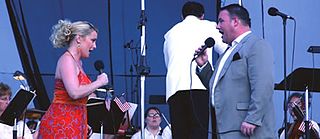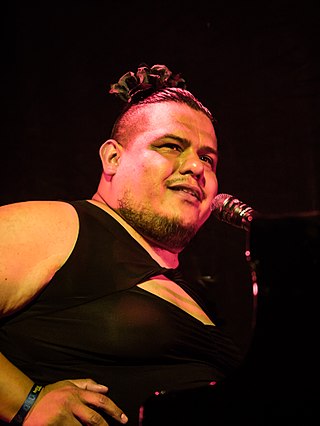Related Research Articles
The Los Angeles Philharmonic is an American orchestra based in Los Angeles, California. Colloquially referred to as the LA Phil, the orchestra has a regular season of concerts from October through June at the Walt Disney Concert Hall, and a summer season at the Hollywood Bowl from July through September. Gustavo Dudamel is the current music director, Esa-Pekka Salonen is conductor laureate, Zubin Mehta is conductor emeritus, and Susanna Mälkki is principal guest conductor. John Adams is the orchestra's current composer-in-residence.

Amado Carrillo Fuentes was a Mexican drug lord. He seized control of the Juárez Cartel after assassinating his boss Rafael Aguilar Guajardo. Amado Carrillo became known as "El Señor de Los Cielos", because of the large fleet of jets he used to transport drugs. He was also known for laundering money via Colombia, to finance this fleet.

Roy and Edna Disney CalArts Theater (REDCAT) is an interdisciplinary contemporary arts center for innovative visual, performing and media arts in downtown Los Angeles, California, located inside the Walt Disney Concert Hall complex. Named for Roy O. Disney and his wife, it was opened in November 2003 as an extension of the California Institute of the Arts' mission into downtown Los Angeles.

The Colburn School is a private performing arts school in Los Angeles with a focus on music and dance. It consists of four divisions: the Conservatory of Music, Music Academy, Community School of Performing Arts and the Trudl Zipper Dance Institute. Founded in 1950, the school is named after its principal benefactor, Richard D. Colburn.
Los Angeles Children's Chorus (LACC) is a children's choral youth organization based in Los Angeles. LACC has appeared in more than 300 performances with such organizations as the Los Angeles Opera, Los Angeles Philharmonic, Los Angeles Master Chorale, Hollywood Bowl Orchestra, and Los Angeles Chamber Orchestra.
Raven Chacon is a Diné composer, musician and artist. Born in Fort Defiance, Arizona within the Navajo Nation, Chacon became the first Native American to win a Pulitzer Prize for Music, for his Voiceless Mass in 2022.
Rosanna Tavarez is an American singer, television host, dancer, and teacher. She rose to prominence in 2001 as a contestant on the American version of the reality television franchise Popstars. As one of the show's five finalists, she became a member of the girl group Eden's Crush. In the same year, they released their debut studio album and its lead single "Get Over Yourself", but disbanded after their record label London-Sire Records closed.

Robin Follman is an American operatic soprano. Her opera credits include performances with Houston Grand Opera, Los Angeles Opera, New York City Opera, Washington National Opera, Michigan Opera Theater, Opera Pacific, Florentine Opera, Singapore Lyric Opera, Lyric Opera Malaysia, Hawaii Opera, and Opera Carolina among others. Her concert work includes performances with the English Chamber Orchestra, the Saint Louis Symphony, the Pacific Symphony Orchestra, the Richmond Symphony, the International Italian Orchestra, the Milwaukee Symphony Orchestra and the Alabama Symphony among others.

Angel Joy Blue is an American soprano. She won the Grammy Award for Best Opera Recording for the Metropolitan Opera production of Porgy and Bess in the 63rd Annual Grammy Awards. Her voice has been recognized for its shining and agile upper register, "smoky" middle register, beautiful timbre, and ability to switch from a classical to a contemporary sound. She has performed internationally and won numerous awards including a Grammy Award, Operalia and Miss Hollywood. According to family lore, her father Sylvester predicted her to be "the next Leontyne Price" when she was born.

Yuja Wang is a Chinese pianist. Born in Beijing, she began learning piano there at age six, and went on to study at the Central Conservatory of Music in Beijing and the Curtis Institute of Music in Philadelphia.

Armando Manuel Aurelio Ortega Carrillo, known as Maestro Armando Ortega, was a Mexican musician, the Director of Coro de la Escuela Secundaria y de Bachilleres de Orizaba (ESBO). His maternal great-grandfather was the philanthropist Don Manuel Carrillo Tablas, who served many times as mayor of Orizaba, Veracruz, Mexico. His maternal grandfather was also a member of the Mexican Legislature at the turn of the 20th century. His paternal grandfather was the illustrious Professor Don Aurelio Ortega y Placeres, considered one of the most brilliant educators of public instruction the state of Veracuz, Mexico produced. His father was the renowned poet and educator, Professor Don Aurelio Ortega Castañeda, who baptized the city of Orizaba with the title of "Nuestra Señora de los Puentes"("Our Lady of the bridges").

Mónica Mayer is a feminist Mexican artist, activist, and art critic whose work includes performance, digital graphics, drawing, photography and art theory. As a conceptual artist, curator, art critic and art theorist she has been engaged in various forums and groups, and has organized workshops and collective movements. From 1988 to 2008, she was a columnist for Mexican newspaper, El Universal. She continues writing for various blogs.

Marta Domingo is a Mexican opera soprano, stage director and designer. In the 1950s and 1960s, she performed as a lyric soprano in Mexico and Israel. Since the 1990s, she has directed operas in Europe and North America. She is married to Spanish tenor Plácido Domingo, who has credited her with helping to guide his career.

Dorian Wood is an American singer, composer, performance artist, visual artist and writer.
Jorge Verdín, known professionally as Clorofila, was one of the pioneers of the Nortec (norteño-techno) musical style that originated in Tijuana, Mexico. Clorofila first came to prominence as a member of Tijuana-based music project Nortec Collective, a group formed by various individual producers and performers. He participated on both Nortec Collective albums under his Nortec identity Clorofila. After the break-up of the collective, Verdín recorded and released two solo albums as Clorofila and two as Tremolo Audio, and co-wrote and co-produced an album of atmospheric post-rock with José Luis Martín under the name Observador. Verdín also created music for theatre and sound design under his name.
Elena Bajo is a visual artist, born in Spain, who currently works out of Los Angeles, California, USA.

Gina Young is an American writer, director, playwright, songwriter and performer. They are a vocal member of the LGBTQ community and are openly queer and nonbinary, using both she and they pronouns. She is a member of The Dramatists Guild, The Ring of Keys, and The Kilroys. They are a winner of the HUMANITAS/PLAY LA Prize, and the Jane Chambers Award for Playwriting for their play Femmes: A Tragedy. Their work has been presented by The Museum of Contemporary Art (MOCA), REDCAT, and The Hammer Museum.
Mark Swed is an American music critic who specializes in classical music. Since 1996 he has been the chief classical music critic of the Los Angeles Times where his writings have made him a two-time finalist for the Pulitzer Prize for Criticism. Prior to his LA Times post, Swed was the chief music critic for the Los Angeles Herald Examiner and The Wall Street Journal, and has contributed other writings to a variety of publications including The Orchestra, an iPad application. He has a particular interest in contemporary classical music.
Monday Evening Concerts (MEC) is the world's longest-running series devoted to contemporary classical music. The concert series, based in Los Angeles, was originally envisioned as a forum for displaced European emigrés and Hollywood studio musicians. MEC has presented contemporary concerts continuously since.
Heidi Aklaseaq Senungetuk is an Inupiaq scholar of ethnomusicology and a musician. She is the daughter of Ronald Senungetuk and Turid Senungetuk and granddaughter of Helen and Willie Senungetuk, and her family roots originate from Wales (Kiŋigin), Alaska. Senungetuk spent her childhood in Fairbanks, where her father founded the Native Art Center and acted as head of the Department of Art at the University of Alaska.
References
- ↑ Fleishman, Jeffrey (March 29, 2018). "Voices of the City: Experimental vocalist Carmina Escobar uses her voice to explore herself and others". Los Angeles Times. Retrieved October 30, 2022.
- ↑ "Iris Carmina Escobar". Music CalArts. Retrieved December 4, 2022.
- 1 2 "About". Howl Space. Retrieved October 30, 2022.
- ↑ Fleishman, Jeffrey (March 29, 2018). "Voices of the City: Experimental vocalist Carmina Escobar uses her voice to explore herself and others". Los Angeles Times. Retrieved November 2, 2022.
- ↑ "(Ana)temA with FILERA". machinproject.com. Retrieved 8 July 2016.
- ↑ "Strange Birds with Carmina Escobar and Ute Wassermann". machineproject.com. Retrieved 8 July 2016.
- ↑ "Vivarium". machinproject.com. Retrieved 8 July 2016.
- ↑ "TENSIONS with Carmina Escobar and Theresa Wong". machineproject.com. Retrieved 8 July 2016.
- ↑ "The Voices From Within: A creative vocal workshop". machineproject.com. Retrieved 8 July 2016.
- ↑ "The Cave with Carmina Escobar". machineproject.com. Retrieved 8 July 2016.
- ↑ "Machine Project". Machine Project. Retrieved October 30, 2022.
- ↑ Vigueras, Fernando. "Carmina Escobar's Massagem Sonora". kcet.org. Retrieved 8 July 2016.
- ↑ "Massagem Sonora with Carmina Escobar". machineproject.com. Retrieved 8 July 2016.
- ↑ "The Machine Project Field Guide to L.A. Architecture". machineproject.com. Retrieved 8 July 2016.
- ↑ "Events". Machine Project. Retrieved October 30, 2022.
- ↑ "Events". Pacific Standard Time. Retrieved October 30, 2022.
- ↑ Stromberg, Matt (May 17, 2017). "13 Performances Reimagine Mexican Rituals on Echo Park Lake". Hyperallergic. Retrieved January 25, 2023.
- ↑ Vankin, Deborah (January 11, 2018). "What's that shower being wheeled around the city? It's the PST festival for performance art". Los Angeles Times. Retrieved January 25, 2023.
- ↑ "Fiesta Perpetua! A Communitas Ritual of Manifestation". Vimeo. Retrieved January 25, 2023.
- ↑ Murray, Yxta Maya (January 17, 2018). "Carmina Escobar's Fiesta Perpetua!". Artillery. Retrieved October 30, 2022.
- ↑ Miranda, Carolina A. (January 31, 2018). "Review: Experimental vocalist Carmina Escobar led an ethereal performance while floating on Echo Park Lake". Los Angeles Times. Retrieved January 25, 2023.
- 1 2 "Iris Carmina Escobar". directory.calarts.edu. Retrieved 8 July 2016.
- ↑ Swed, Mark. "Review Liminar makes Mexico's Carrillo look like the next great rediscovery". Los Angeles Times . Retrieved 8 July 2016.
- ↑ Corral, Daniel. "5.5 QUESTIONS FOR CARMINA ESCOBAR". sassas.org. Retrieved 8 July 2016.
- ↑ Madrid, Alejandro (2015). In Search of Julián Carrillo and Sonido 13. Oxford: Oxford University Press. pp. 279–81. ISBN 978-0190215781.
- ↑ "Liminar Performs Works by Modernist Composer Julián Carrillo at REDCAT". CalArts Blog 24700. Retrieved December 2, 2022.
- ↑ Swed, Mark (December 13, 2015). "Review: Liminar makes Mexico's Carrillo look like the next great rediscovery". Los Angeles Times. Retrieved December 2, 2022.
- ↑ "Carmina Escobar Premieres Pura Entraña at REDCAT". Blog CalArts. Retrieved October 30, 2022.
- ↑ "Pura entraña long trailer". Vimeo. Retrieved December 5, 2022.
- ↑ "Carmina Escobar: Bajo la sombra del sol (Under the Sun's Shadow)". RedCat. Retrieved October 30, 2022.
- ↑ Miranda, Carolina. "Newsletter: How a performance about California's environment was shaped by water and fire". Los Angeles Times. Retrieved October 30, 2022.
- ↑ "Bajo la sombra del sol Trailer". Vimeo. Retrieved November 3, 2022.
- ↑ "Raven Chacon: For Zitkála-Šá". New Documents. Retrieved June 14, 2023.
- ↑ "For Zitkála-Šá - Carmina Escobar by Raven Chacon". Vimeo. Retrieved June 14, 2023.
- ↑ Mitter, Siddhartha (January 25, 2022). "Whitney Biennial Picks 63 Artists to Take Stock of Now". The New York Times. Retrieved June 14, 2023.
- ↑ Pyron, Jennifer (August 2, 2022). [The Whitney Biennial 2022 Review: Raven Chacon's 'For Zitkála-Šá' "The Whitney Biennial 2022 Review: Raven Chacon's 'For Zitkála-Šá'"]. Opera Wire. Retrieved June 14, 2023.
{{cite web}}: Check|url=value (help) - ↑ Swed, Mark (March 1, 2020). "Review: 'Sweet Land' astonishes. Opera in an L.A. park examines what it means to be American". The Los Angeles Times. Retrieved September 23, 2023.
- ↑ Campbell, Andy (January 30, 2018). "Glory Be". Artforum. Retrieved September 23, 2023.
- ↑ Murray, Yxta Maya (November 10, 2020). "Reconnoiter: Carmina Escobar". Artillery Magazine. Retrieved December 2, 2020.
- ↑ "About". Boss Witch Productions. Retrieved October 30, 2022.
- ↑ "Boss Witch Projects". Boss Witch Productions. Retrieved December 4, 2022.
- ↑ "Dos Estaciones". sinsitiocine.com. Retrieved May 12, 2023.
- ↑ "Dos Estaciones trailer". YouTube.com. Retrieved May 12, 2023.
- ↑ Sheri, Linden (May 4, 2022). "'Dos Estaciones': Film Review". hollywoodreporter.com. Retrieved May 12, 2023.
- ↑ Fagerholm, Matt (September 9, 2022). "Reviews: Dos Estaciones". RogerEbert.com. Retrieved May 12, 2023.
- ↑ "National Association of Latino Arts and Cultures". nalac.org. Archived from the original on 2 May 2017. Retrieved 8 July 2016.
- ↑ "Recipients". Foundation for Contemporary Arts. Retrieved October 30, 2022.
- ↑ "Bemis Center Residents". Bemis Center. Retrieved November 17, 2022.
- ↑ "Announcing the Fall 2020 Creation Fund Awards". The National Performance Network. Retrieved November 17, 2022.
- ↑ "MacDowell Artists". MacDowell Artists. Retrieved November 17, 2022.
- ↑ Schray, Martin (13 September 2013). "Estamos Trio - People's Historia (Relative Pitch, 2013) ****". Free Jazz Collective. Retrieved 24 January 2023.
- ↑ "T Z A T Z I". a wave press. Retrieved 24 January 2023.
- ↑ Grella, George; Cohan, Brad (December 2019). "Highly Selective Listings". Brooklyn Rail. Retrieved 24 January 2023.
- ↑ Escobar, Carmina; Heying, Madison; Steenberge, Laura (3 June 2020). Feast of Beams, Keepers of Light. Indexical Incorporated. ISBN 978-1735112800.